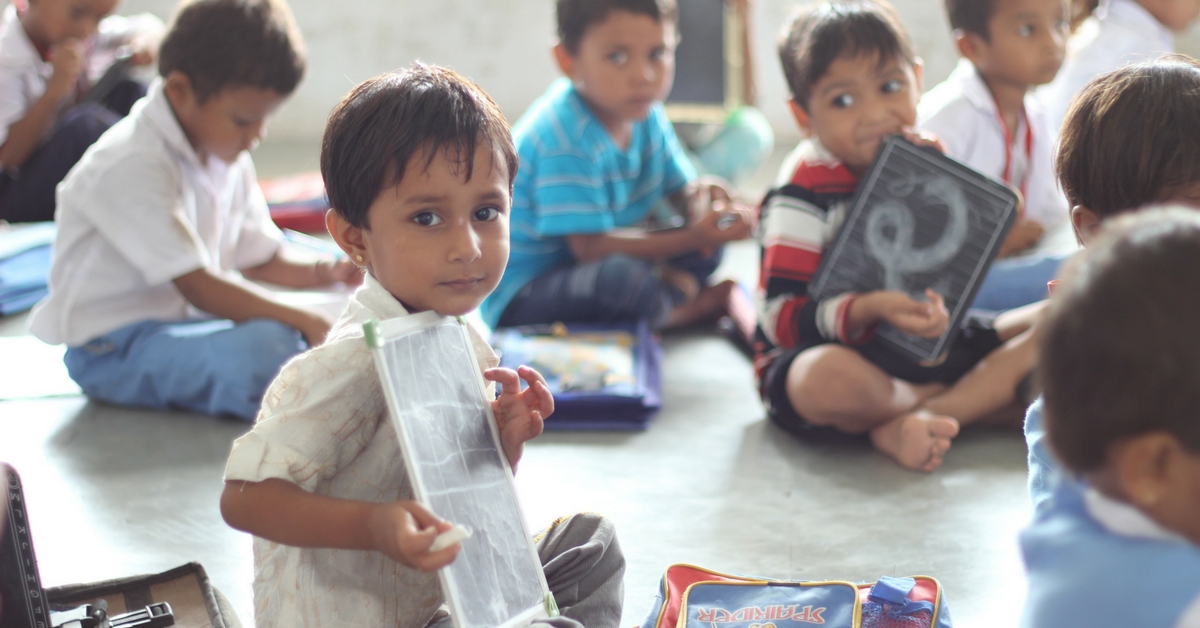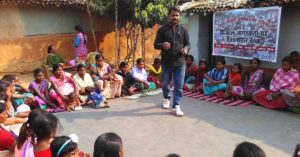TBI Blogs: An Ahmedabad Organisation Has Been Educating the City’s Underprivileged Children for over 15 Years
Ahmedabad’s underprivileged kids have a safe haven and a place that encourages them to explore their potential in city-based organisation Arzoo’s schools and centres.

Every once in a while, when one becomes disillusioned with the violence and endless suffering faced by humanity, it is easy to imagine that human beings have forgotten about love and compassion. But it goes without saying that amongst us are many brave men and women who don’t care for riches or success as much as they desire to make this world a better place.
Arzoo, a small organisation based in Ahmedabad that works to educate children from disadvantaged communities, is a good example of what determination and compassion can achieve in the face of great odds. All it needed was a visit to Arzoo’s main centre to restore my faith in humanity.
When I first contacted Sulekha Ali, the founder of the NGO, she informed me that I might have to postpone my visit. “I’m out of station, and I heard there is no power in the centre, so not much going on at the moment. Hopefully in a week or so, things will be back to normal.”
Still, I hopefully called Gulnaaz, one of the teachers whose number Sulekha had given me, and was surprised to hear her enthusiasm about my visit.
“Of course you can come! Yes, there is no power, but we still meet there. This Sunday, the children are staging a talent show, where they’ll sing and perform dances! Do come if you can!”

The Arzoo Centre in Jamalpur isn’t much – just a basement hall in a decrepit commercial complex, right next to a barbershop. There is no signboard. The place is rather dark, and devoid of furniture, but the echoes of children laughing can be heard from outside.
Arzoo was founded in 2002, in the aftermath of the riots that ravaged Ahmedabad. Sulekha Ali decided to set up the school for orphans and children whose families were suddenly impoverished, having lost their businesses or homes to the violence. Among her first students were Gulnaaz and Bhartiben, both of whom now teach at the school.
The talent show is in full swing, and some boys are grooving to a Honey Singh number as the other kids cheer. Gulnaaz, who looks much younger than I imagined, joins in with a few moves of her own. I look around to see walls covered in the energetic bursts of creativity by the kids, and despite the dinginess, the air feels bright and positive. About an hour later, after the show, I sit down with Gulnaaz, Bhartiben, and Dhruv Sharma to talk a little about Arzoo, and the work that they do here.
This hall, I find out, is now only used for special occasions, and most classes are conducted in different localities across the city. Dhruv explains why that is so. “Arzoo started out small, and at that time, this hall was sufficient. But over time, the number of students increased, and space became an issue. It was difficult to handle a large classroom.”
“Another problem was that many parents found it difficult to send their children to school. Either they had no time, or lived too far away!”

As a result, Arzoo began to set up community schools, with individual teachers attending to smaller groups of students in each neighbourhood, or mohalla. Classes are often conducted in the teacher’s own house if no other common space is available.
While the joy of teaching keeps her going, Gulnaaz recounts some of the challenges they faced while trying to get children to attend the school. “We had to go from house to house and request families to send their children. Just ensuring that they attend on a regular basis is a task. Sometimes parents don’t understand, because they aren’t educated themselves,” she says, shaking her head.
The schools that Arzoo runs are meant to complement the government-funded community learning centres, or anganwadis, that exist in many neighbourhoods, rather than replace them. Though started for riot-affected kids, the focus of Arzoo has shifted over the years. Today, most children come from underprivileged families who can’t afford regular schools,or go to municipal schools.
Despite its growth, the NGO has always had to operate within a modest budget, and frequently finds itself short of funds. However, donations from many philanthropists and charity funds have helped keep things afloat.
“Recently, our founder Sulekha ma’am received a scholarship, and is currently doing a PhD in Kenya! I hope that someday I can also go to college,” Gulnaaz says, her eyes shining.

During the talent show, I had watched her and Bhartiben manage a gang of 50 children with ease. They handled the kids with maturity and maternal compassion, but I was amazed to learn that both of them were hardly past their teens themselves. Dhruv laughs, “When I first talked to her over the phone, I imagined that she must be a woman in her 50s, experienced in managing an NGO all by herself. Imagine my surprise when I came here and met her for the first time!”
Gulnaaz berates him for that, and suddenly I see the little girl in her, all of 18 years old and full of energy and enthusiasm, untouched by the cynicism of old age. The same goes for Bharti, who I don’t feel like referring to as ben anymore. She is only 21, and also dreams of going to college. “Just a BA is enough, I’m not being too ambitious.” She is quiet and rather shy. She tells me that her family owns a vadapav stall at Kankariya Lake, and invites me to come sample some.
The most talkative of them is Dhruv, an energetic and engaging young man originally from Delhi, who has strong opinions on the poor state of the Indian education system. He received his Master’s degree from Nirma University, and during his time there, became convinced that his heart lay in social work.
“It was a hard decision to take, because I’m not from a rich family. There was always pressure to find a job and start earning. But I realised that working for society gives me the greatest happiness! I could go for a six-figure salary in some big company, but if I’m miserable in life, then what’s the point?” Dhruv now lives on a tight budget, but is able to save enough for himself, and loves his work besides.
“I plan to go work in a larger organisation soon, but Arzoo is where I started, and it’s where my heart is!”

The three of them together give hope for a better and brighter future for these children, and it is heartening to see them carrying out their work with selfless dedication, without expecting anything in return. “I myself studied here, and Arzoo has given me a lot. I just felt that I had to give back in some way,” Gulnaaz says. Bharti pipes in, “Studies didn’t really interest me. I would come here to play with some friends who studied here. But seeing them have fun and learn at the same time inspired me and kindled my interest for studying. I am thankful for that!”
Arzoo has at least four other teachers on the roster, besides these three. Together they manage everything, from teaching to management and outreach. “This is a labour of love, so everybody does more than just their job. It’s a collective effort, and we are like a family!” With that, I thank them for their time and take my leave. My heart is light, and the music of laughing children is still ringing in my ears…
Do you know stories of people that will help map your city better? Find out how you can contribute to The People Place Project here.
Featured Image is for representational purpose only. (Source: Pixabay)
Like this story? Or have something to share? Write to us: [email protected], or connect with us on Facebook and Twitter.
NEW: Click here to get positive news on WhatsApp!
If you found our stories insightful, informative, or even just enjoyable, we invite you to consider making a voluntary payment to support the work we do at The Better India. Your contribution helps us continue producing quality content that educates, inspires, and drives positive change.
Choose one of the payment options below for your contribution-
By paying for the stories you value, you directly contribute to sustaining our efforts focused on making a difference in the world. Together, let's ensure that impactful stories continue to be told and shared, enriching lives and communities alike.
Thank you for your support. Here are some frequently asked questions you might find helpful to know why you are contributing?


This story made me
-
97
-
121
-
89
-
167














